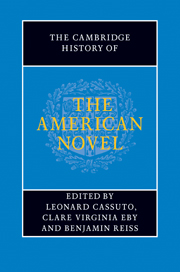Book contents
- Frontmatter
- General Introduction
- PART ONE INVENTING THE AMERICAN NOVEL
- PART TWO REALISM, PROTEST, ACCOMMODATION
- PART THREE MODERNISM AND BEYOND
- Introduction: modernism and beyond
- 37 Stein, Hemingway, and American modernisms
- 38 The Great Gatsby and the 1920s
- 39 Philosophy and the American novel
- 40 Steinbeck and the proletarian novel
- 41 The novel, mass culture, mass media
- 42 Wright, Hurston, and the direction of the African American novel
- 43 Ellison and Baldwin: aesthetics, activism, and the social order
- 44 Religion and the twentieth-century American novel
- 45 Faulkner and the Southern novel
- 46 Law and the American novel
- 47 Twentieth-century publishing and the rise of the paperback
- 48 The novel of crime, mystery, and suspense
- 49 US novels and US wars
- 50 Science fiction
- 51 Female genre fiction in the twentieth century
- 52 Children's novels
- 53 The American novel and the rise of the suburbs
- 54 The Jewish great American novel
- 55 The Beats and the 1960s
- 56 Literary feminisms
- 57 Reimagining genders and sexualities
- PART FOUR CONTEMPORARY FORMATIONS
- A selected bibliography
- Index
56 - Literary feminisms
from PART THREE - MODERNISM AND BEYOND
Published online by Cambridge University Press: 28 July 2011
- Frontmatter
- General Introduction
- PART ONE INVENTING THE AMERICAN NOVEL
- PART TWO REALISM, PROTEST, ACCOMMODATION
- PART THREE MODERNISM AND BEYOND
- Introduction: modernism and beyond
- 37 Stein, Hemingway, and American modernisms
- 38 The Great Gatsby and the 1920s
- 39 Philosophy and the American novel
- 40 Steinbeck and the proletarian novel
- 41 The novel, mass culture, mass media
- 42 Wright, Hurston, and the direction of the African American novel
- 43 Ellison and Baldwin: aesthetics, activism, and the social order
- 44 Religion and the twentieth-century American novel
- 45 Faulkner and the Southern novel
- 46 Law and the American novel
- 47 Twentieth-century publishing and the rise of the paperback
- 48 The novel of crime, mystery, and suspense
- 49 US novels and US wars
- 50 Science fiction
- 51 Female genre fiction in the twentieth century
- 52 Children's novels
- 53 The American novel and the rise of the suburbs
- 54 The Jewish great American novel
- 55 The Beats and the 1960s
- 56 Literary feminisms
- 57 Reimagining genders and sexualities
- PART FOUR CONTEMPORARY FORMATIONS
- A selected bibliography
- Index
Summary
The decades 1945–1965 have appeared to mark an intermission in the unfolding history of US feminisms – a period of stasis or even retrogression following the gains of the New Women of a half century earlier, and the Rosie the Riveters of the previous decade. By the twentieth century's end, earlier feminisms appeared classist, racist, and overly universalizing in their conception of the category of “woman,” so that the period between World War I and Vietnam might be seen to epitomize the prevalence of consensus culture within feminism itself. This chapter aims to counter this periodization of US feminisms through a re-examination of mid-century women's literature, focusing on three pivotal texts: Mary McCarthy's The Group (1962), Sylvia Plath's The Bell Jar (1963 UK, 1971 USA); and Betty Friedan's The Feminine Mystique (1963). Published between the first wave of liberal feminism (dating to the late nineteenth and early twentieth centuries), which largely focused on legal and political equality, and second wave feminism (dating to the 1960s and 1970s), these texts recapitulate some of the signal concerns of early twentieth-century feminism: the concern with the milieu of higher education; the depiction of the diminished options for women in the workplace; and the celebration of potential freedoms gained through sexual expression. Yet they also articulate the shared sense that women at mid-century had failed to progress sufficiently, and thus begin to point forward to many of the concerns of feminism's second wave, especially its attention to the psychological implications of sexist stereotypes; the failed promise of sexual liberation for women's liberation; and the repressive character of institutions such as psychiatry.
- Type
- Chapter
- Information
- The Cambridge History of the American Novel , pp. 925 - 940Publisher: Cambridge University PressPrint publication year: 2011
- 1
- Cited by



